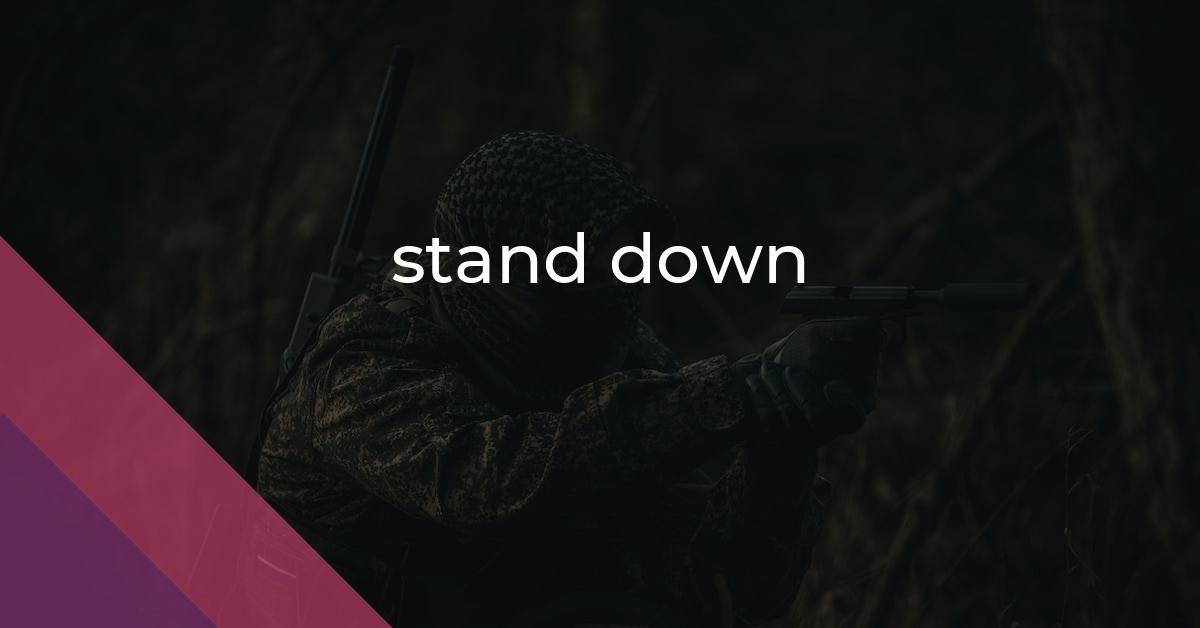stand down: Idiom Meaning and Origin
What does ‘stand down’ mean?
The idiom "stand down" means to withdraw or relinquish a position or claim, often in response to a request or order.

Idiom Explorer
The idiom "turn down" means to reject or refuse something, usually an offer or invitation.
The idiom "take time out" means to pause or suspend activities, often to rest or relax, before continuing with them later.
The idiom "take one's leave" means to say goodbye or depart from a place or a person.
The idiom "take down a peg" means to humble or deflate someone's arrogant or self-important attitude.
The idiom "take down a notch" means to humble or humiliate someone, usually in response to arrogant behavior or excessive self-confidence.
The idiom "take a stand" means to publicly express one's opinion or position on a certain issue, often in a bold and assertive manner.
The idiom "take a back seat" means to take a less prominent or active role in a situation or to allow others to take the lead.
The idiom "switch off" means to lose interest or become disengaged from something mentally or emotionally, often resulting in a lack of attention or focus.
The idiom "step down" means to resign or give up a position of power or authority voluntarily.
Unraveling Interpretations
The idiom "stand down" is a commonly used phrase in English that has its origins in military terminology. It is used in both literal and figurative contexts, with slightly different meanings in each.
In its literal sense, "stand down" refers to soldiers being relieved from their duty or position. It can happen when they complete an assignment or at the end of a shift. This denotes a temporary or permanent release from active duty.
Figuratively, "stand down" means to cease your current course of action, step back, or withdraw from a conflict or position of authority. It suggests abandoning your stance or position and allowing others to take over or lead instead.
Etymologically, the phrase "stand down" dates back to the mid-20th century and is believed to have originated in military commands and orders. Its usage in non-military contexts became widespread as metaphors related to military affairs began to permeate everyday language.
In a broader context, "stand down" can also imply a call for calmness, de-escalation, or ceasing aggressive behavior. It conveys the idea of putting aside hostility and refraining from further action or engagement.
Additionally, "stand down" can be used in legal settings to refer to the dismissal or withdrawal of a legal claim or case. It implies that the party initiating the action no longer wishes to pursue legal measures against the opposing party.
The idiom "step down" is related to "stand down." To step down means to voluntarily resign or relinquish a position of responsibility or authority. It is often used in the context of leadership roles, such as CEOs or government officials, who choose to leave their positions. "Step down" implies a conscious decision to relinquish control and allow someone else to take over.
Similarly, "back down" is another related idiom. It means to retreat or withdraw from a position or course of action, usually due to opposition or pressure from others. "Back down" suggests a change in stance or opinion, where one chooses not to continue in their current course despite initial determination. This idiom can be used in various contexts, such as negotiations, conflicts, or debates.
Overall, the idiom "stand down" has evolved to encompass several meanings and uses. From its military roots to its figurative and metaphorical applications, it suggests the relinquishment of a role, the cessation of hostilities, or the abandonment of a contentious position. Its multifaceted nature makes it a versatile idiom that finds relevance in various contexts.
Example usage
Examples of how the idiom stand down can be used in a sentence:
- After completing their mission, the soldiers were instructed to stand down and return to the base.
- The union decided to stand down from their demands and negotiate a compromise with the company.
- Once the emergency situation was resolved, the evacuation order was lifted, and residents were advised to stand down and return to their homes.
More "Command" idioms



